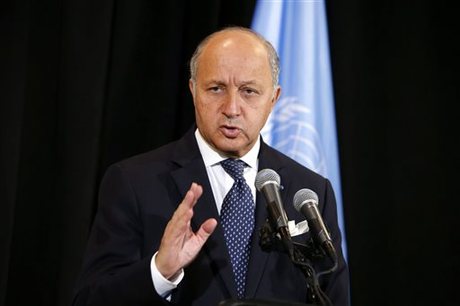Russia 'Cautiously Optimistic' on Iran Nuclear Talks, Paris Says 'No Progress'
إقرأ هذا الخبر بالعربية
Top U.S. diplomat John Kerry was to meet with his Iranian counterpart Friday for a second time in two days, amid reports that tough talks on reining in Tehran's nuclear program have become deadlocked.
"At this time as I speak, there is no significant progress," French Foreign Minister Laurent Fabius said of the latest round discussions.
Negotiators from the so-called P5+1 group -- Britain, China, France, Russia, the United States plus Germany -- began a new round of talks last Friday with only two months before a new November 24 deadline to reach a deal on Tehran's suspect nuclear program.
Seeking to make progress, the talks moved to a higher level Thursday when Kerry huddled late Thursday in a small New York hotel with Iranian Foreign Minister Mohammad Javad Zarif and the EU's chief negotiator Cathy Ashton.
But trilateral discussion broke up with little news filtering out and U.S. officials refused to reply to Agence France-Presse inquiries about reports of a new offer on the table.
Friday's "meeting will be a continuation of the discussions the three delegations held today on Iran’s nuclear program," was all a State Department official said in a terse statement.
"We will be quickly meeting again. We regret that there has been no progress," Fabius told reporters Friday on the sidelines of the U.N. General Assembly, adding that a ministerial level P5+1 meeting had been canceled.
At the heart of the issue is a fundamental clash between the West's desire to dismantle Iran's capability to produce a nuclear bomb, and the Islamic republic's insistence that it should retain the capacity to enrich uranium for a civilian energy program.
The West wants Iran to dismantle virtually all but a few thousand of its 19,000 centrifuges which can be used to develop weapons-grade uranium.
But Iran bristles at destroying machines in which it has invested billions of dollars, and wants to retain many more of the centrifuges.
On Thursday, Iranian President Hassan Rouhani told the U.N. his country was "determined to continue negotiations with our interlocutors in earnest and good faith, based on mutual respect and confidence."
Echoing U.S. President Barack Obama's words to the General Assembly, he agreed a nuclear deal would be a "historic opportunity" that would send a message of "peace and security."
Complicating the talks are domestic politics.
Under an interim deal agreed last November, Iran agreed to freeze parts of its nuclear program and allow daily inspections of some nuclear sites in return for a partial release of billions of dollars from blocked oil revenues.
But U.S. lawmakers are already drawing up more sanctions to hit Washington's arch-foe, while Iranian leaders are under pressure to win a lifting of the crippling economic measures without conceding too much.
The final deal would be designed to ease fears that despite its denials Iran is seeking to develop the atomic bomb, by expanding the time needed for Tehran to develop a nuclear weapon and allowing for a tough monitoring regime by the U.N. nuclear watchdog, the IAEA.
Analysts fear however that even if a deal is reached, Iran could try to secretly continue to develop its nuclear capabilities.
"The intelligence community judges it more likely that Tehran would chose a clandestine effort, sometimes called 'sneakout' not using facilities that it had declared to the IAEA," wrote Greg Thielmann from the Arms Control Association.
"This would theoretically allow Iran to minimize the international community’s warning time and ability to take effective blocking action."
Rouhani met late Thursday with German Foreign Minister Frank-Walter Steinmeier, who said they had "good and intense talks.
"I think we can say that we have never been closer in the past 10 years than we are now, but the truth is the last part of the journey... is probably the most difficult. There are still obstacles to overcome," Steinmeier said.
Later on Friday, Russian Foreign Minister Sergei Lavrov said he was "cautiously optimistic" about talks on Iran's nuclear program despite statements from France that negotiations had failed to yield progress.
"As regards Iran nuclear program talks, I remain cautiously optimistic," Lavrov told reporters at U.N. headquarters in New York.
Negotiators from Britain, China, France, Russia, the United States plus Germany began a new round of talks last Friday with only two months before a new November 24 deadline to reach a deal on Tehran's suspect nuclear program.
"If we look at the drafting process of the text, we are very close to our goal but there are sections remaining," Lavrov said. "These sections are the most complicated," he added.
But the Russian minister said there was still time to reach a deal.
"I have this feeling that all parties are interested in seeing a productive resolution. We still have time until November 24," he said.
"We'll do our utmost to make sure that the remaining small, but extremely important issues be resolved in a way that would be acceptable to all."



